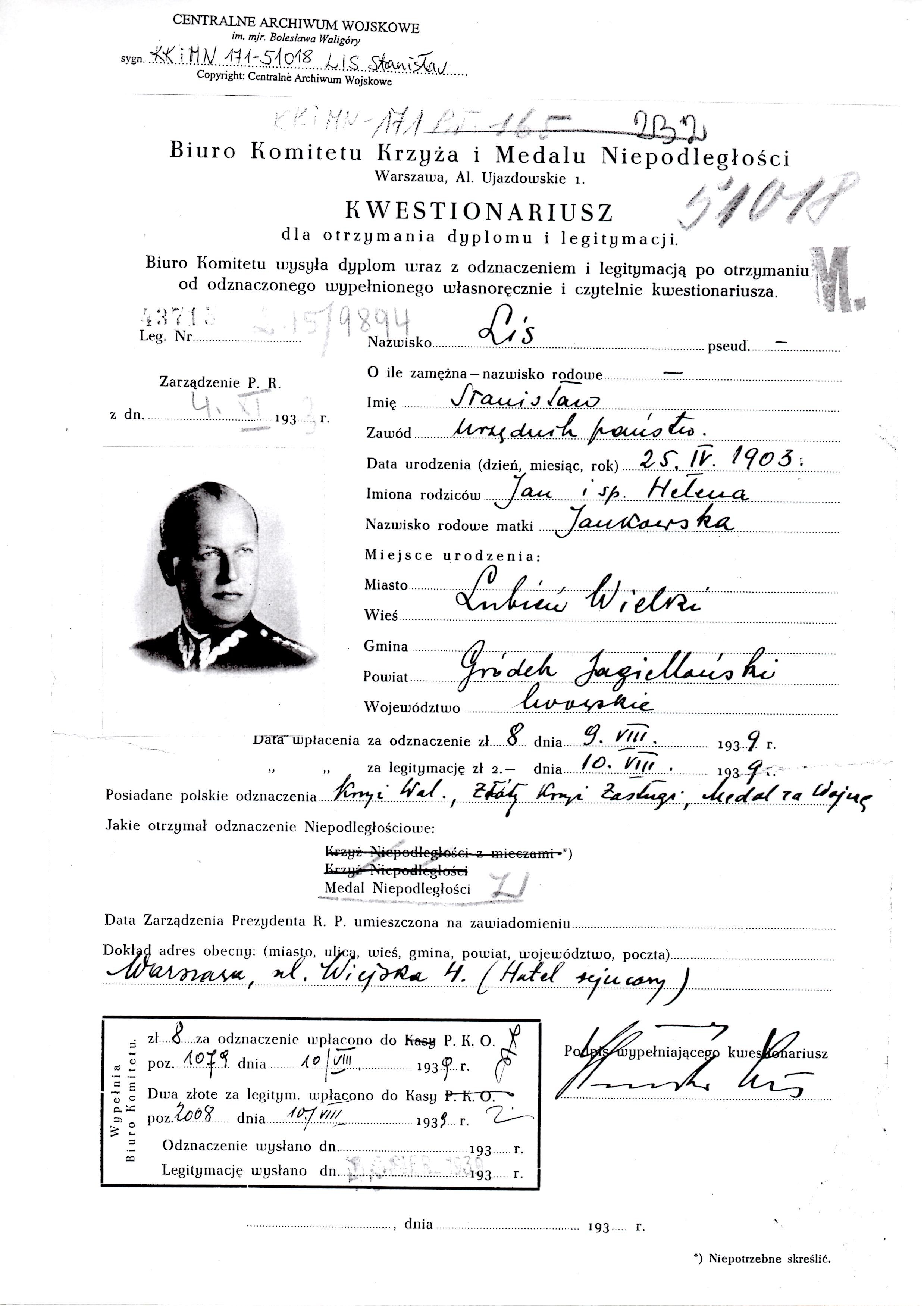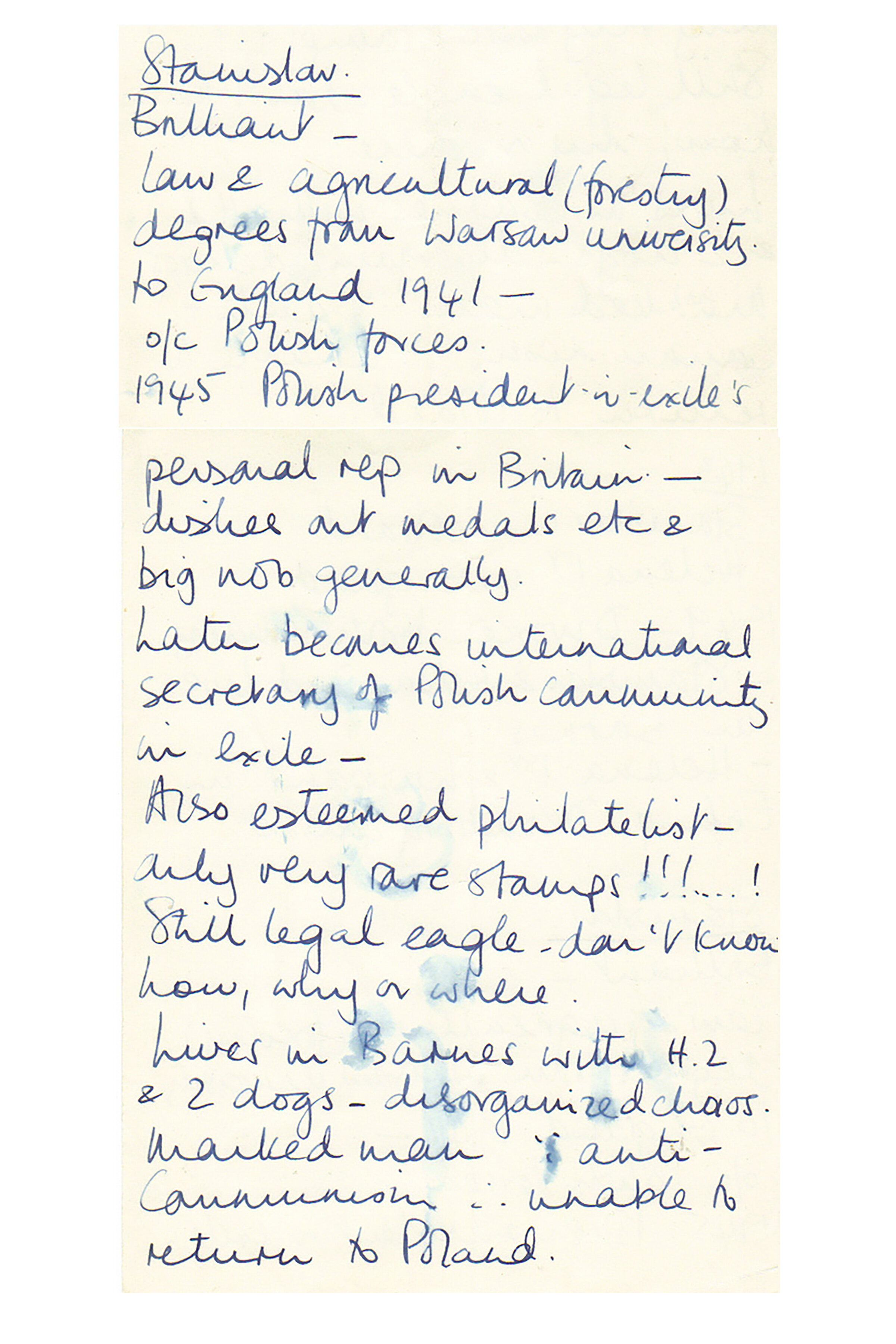Stanislaw Lis
Luke Hagen holding his Great Great Grandfathers portrait. 2019 © jennie milne
Stanislaw Lis was born in Lubien Wielki, nr Lwow (Lemburg) in the Austro Hungarian Empire on April 25th, 1903. Stanislaw was at school during WW1. When war broke out he wanted to join the Legions at the first opportunity (he was 11 at the time) but was prevented by the Russian advance and occupation of Rawa Ruska where he was then living.
The following year, 1915, he was involved in stealing rifles and ammunition from a Russian supply column and causing further disruption and delay to another column. Although investigated by the Russians, he was not associated to these actions as ‘no-one suspected me on account of my age’.
As a 16-year-old boy he took part in the defence of Lwow as an artillery gunner and was decorated with the Cross of Valour. In 1920 he served in the 205th Light Artillery Regiment and was twice nominated for Poland’s highest military medal, the Virtuti Militari in recognition of his bravery in a battle against the Red Army.
He finished college in Zolkiew and then started higher studies at the Agricultural/Forestry department at Lwow Polytechnic. After qualifying he followed his father's footsteps into Forestry. He didn't stay there long, making his way to Warsaw where he was first exposed to politics and worked in the Parliamentary Bureau. He married Helena Kozdon (Rothenberg) in Warsaw in 1933, and completed a further degree in Law at the Warsaw University.
When the Germans invaded Poland in September 1939, he was already at his post as an Officer in the 1st Horse Artillery Battery having been called up in the early hours of the morning a few days earlier. He fought with his men but became a German prisoner of war when Warsaw capitulated. Four days later he managed to escape and found his way to France, where he fought again, receiving the French Croix de Guerre for bravery at Sarralbe. When France fell, he fled across the border to Switzerland, where he was interred until he escaped, making his way across occupied Europe before boarding a boat to Liverpool, arriving in October 1941.
Stanislaw Lis, warsaw University 1931
Once in the U.K, Stanislaw was posted to Scotland, initially with the 7th Field Artillery Battery of the 7th Officers Cadre Rifle Brigade in Dundee. From December 1941 until September 1943 he was posted to the Officer Cadet Artillery School, which was located at Coupar Angus, before moving to Fife. He remained in Scotland for the duration of the war, training Polish Troops under British command. It is believed he also worked in intelligence.
Stanislaw’s wife, Helena, also fled Poland. Her nephew recorded in his memoirs that she escaped with the Polish Government, but this is unconfirmed. It is not known how she arrived in Britain, but she also joined the Polish Forces under British Command. The couples only child, Elizabeth Lis, was born in London in 1943 and ‘hidden’ by Helena in a wartime babies’ home in Devon.
Following the war Stanislaw settled in England and immediately threw himself into the maelstrom of Socio-Political work which was his passion. He worked as a lawyer and member of the Polish government in exile. He maintained a high profile in the Polish émigré and his eulogy, given by Dr. T Bielecki at the 19th meeting of the Council of National Unity, stated that;
“His whole life was tied to Poland. The very number of posts he occupied give testament to richness of his efforts and range of interests. He was the deputy-chairman of the World Federation of Polish ex-Servicemen, a member of the Commission for the National Treasury, secretary of the Armed Forces Unit's Association, President of the Grenadiers Association, a member of the Polish Journalist's Union and had even established the Association of Polish Philatelists. For four years (1954 -1959) he stood at the head of the Movement for Polish Unity and it was at his particular insistence, that the famous 'silent march' took place, as a sign of protest at the Soviet occupation of Poland, during the visit of Bulganin and Khruschev in London. This was the greatest and most successful effort of sp. Prezes Lis and of which he can be rightly proud”
Elizabeth’s handwritten notes after meeting her father in London in 1965
Stanislaw’s daughter, Elizabeth traced him to London in 1964. He welcomed her and they spent time together visiting the Polish Club in London. He told her he was unable to return to Poland as he was a marked man. Sadly, Elizabeth lost contact in 1966 and was unaware her father died suddenly in 1967, a political exile, unable to return to his beloved homeland. He is buried in Gunnersbury Cemetery in London.
Stanislaw’s granddaughter, Jennie Milne determined to trace her grandparents in 2014, and through his M.O.D records was able to uncover his story. The Polish Military plan to hold an exhibition “His Life Still Speaks” created by Jennie and Historian Janusz Ral, based on his Military career in Warsaw. This was sceduled to be held in the Warsaw Garrison in September 2020 to commemorate 100 years since the battle for Polish Independance, but is currently posponed due to Covid 19. https://www.fragmentsthatremain.co.uk/his-life-still-speaks-commemorating-major-stanislaw-lis
Many of his descendants live in Scotland today and are thankful for his selfless courage and sacrifice.
Post War Synopsis;
Stanislaw Lis was a notable figure within the Polish expatriate community in the United Kingdom, where he became deeply involved in anti-communist activism during the Cold War era. His life and work were marked by a steadfast opposition to Soviet influence in Eastern Europe, and he dedicated much of his energy to organizing and supporting Polish nationals in their resistance to communism.
Born in Poland, Lis’s early years were likely shaped by the tumultuous events of World War II and the subsequent imposition of Soviet-backed communist rule in Poland. Like many Poles who opposed the new regime, he emigrated to the UK, where he could advocate for freedom without fear of persecution. The Polish expatriate community in Britain, particularly in London, was significant during the Cold War, and many members, including Lis, felt a profound responsibility to support their homeland's fight for independence.
Lis became active in various Polish organizations in the UK, where he worked to raise awareness about the realities of life under communism in Poland and other Eastern Bloc countries. His role in organizing events, protests, and marches was central to bringing attention to issues affecting Eastern Europe. These events included silent marches, demonstrations, and public meetings, through which he and others communicated the message of resistance to both British society and the international community.
One of Lis's key focuses was the dissemination of information, as he believed that education about Soviet oppression would strengthen support for Eastern European independence. Alongside other Polish activists, he engaged with the British press and collaborated with other anti-communist groups in Western Europe, fostering a network of support for Polish causes.
Though much of his work may have occurred behind the scenes, Lis’s commitment and actions were part of the broader struggle that contributed to the eventual weakening of communist regimes in Eastern Europe. His legacy is reflective of the dedication of Polish expatriates who, despite living far from their homeland, maintained a fervent hope and effort toward Poland’s liberation.
For more information please contact Jennie Milne: jenniemilne67@gmail.com





